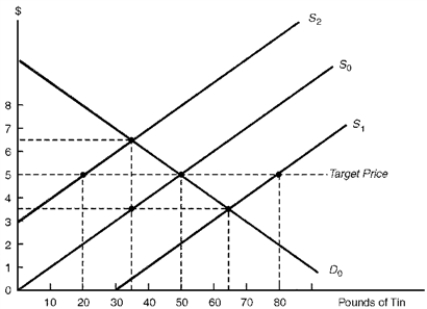Exam 7: Trade Policies for the Developing Nations
Exam 1: The International Economy and Globalization48 Questions
Exam 2: Foundations of Modern Trade Theory: Comparative Advantage166 Questions
Exam 3: Sources of Comparative Advantage108 Questions
Exam 4: Tariffs124 Questions
Exam 5: Nontariff Trade Barriers134 Questions
Exam 6: Trade Regulations and Industrial Policies129 Questions
Exam 7: Trade Policies for the Developing Nations100 Questions
Exam 8: Regional Trading Arrangements130 Questions
Exam 9: International Factor Movements and Multinational Enterprises96 Questions
Exam 10: The Balance of Payments92 Questions
Exam 11: Foreign Exchange121 Questions
Exam 12: Exchange-Rate Determination133 Questions
Exam 13: Mechanisms of International Adjustment107 Questions
Exam 14: Exchange-Rate Adjustments and the Balance of Payments100 Questions
Exam 15: Exchange-Rate Systems and Currency Crises107 Questions
Exam 16: Macroeconomic Policy in an Open Economy72 Questions
Exam 17: International Banking: Reserves, Debt, and Risk96 Questions
Select questions type
To promote stability in commodity markets,International Commodity Agreements have utilized production and export controls,buffer stocks,and multilateral contracts.
(True/False)
4.7/5  (45)
(45)
Which of the following is not a major factor that encourages developing nations to form international commodity agreements?
(Multiple Choice)
4.8/5  (35)
(35)
To be considered a good candidate for an export cartel,a commodity should:
(Multiple Choice)
5.0/5  (43)
(43)
Which nation accounts for the largest amount of OPEC's oil reserves and production?
(Multiple Choice)
4.8/5  (44)
(44)
To help developing nations strengthen their international competitiveness,many industrial nations have granted nonreciprocal tariff reductions to developing nations under the:
(Multiple Choice)
4.9/5  (38)
(38)
In 1999 the United States revoked the normal-trade-relations (most-favored-nation)status it provided China in retaliation for China's suppression of human rights.
(True/False)
4.9/5  (35)
(35)
To prevent the market price of tin from rising above the target price,the manager of a buffer stock will purchase excess supplies of tin from the market.
(True/False)
4.9/5  (47)
(47)
Developing countries have complained that because their commodity terms of trade has deteriorated in recent decades,they should receive preferential tariff treatment from industrialized countries.
(True/False)
4.8/5  (38)
(38)
A multilateral contract stipulates the maximum price at which importing nations will purchase guaranteed quantities from producing nations and the minimum price at which producing nations will sell guaranteed amounts to importing nations.
(True/False)
4.9/5  (37)
(37)
Rather than conduct massive stabilization operations,buffer stock officials will periodically revise target prices should they move out of line with long-term price trends.
(True/False)
4.8/5  (42)
(42)
When cartel members agree to restrict output to increase the price of their product,a single member of the cartel has an economic incentive to violate the agreement by increasing its output so as to increase profits.
(True/False)
4.7/5  (46)
(46)
During the late 1980s and early 1990s,China dismantled much of its centrally-planned economy and permitted free enterprise to replace it.
(True/False)
4.9/5  (45)
(45)
Not only do changes in demand induce relatively wide fluctuations in price when supply is inelastic,but changes in supply induce relatively wide fluctuations in price when demand is inelastic.
(True/False)
4.8/5  (31)
(31)
Most of China's manufactured exports have constituted labor-intensive goods.
(True/False)
4.8/5  (36)
(36)
To prevent the market price of tin from falling below the target price,the manager of a buffer stock would purchase any excess supply of tin that exists at the target price.
(True/False)
4.8/5  (25)
(25)
Concerning the hypothesis that there has occurred a long-run deterioration in the developing countries' terms of trade,empirical studies provide:
(Multiple Choice)
4.9/5  (37)
(37)
Figure 7.2.Defending the Target Price in Face of Changing Supply Conditions  -Consider Figure 7.2.Suppose the supply of tin increases from S0 to S1.Under a buffer stock system,the buffer-stock manager could maintain the target price by:
-Consider Figure 7.2.Suppose the supply of tin increases from S0 to S1.Under a buffer stock system,the buffer-stock manager could maintain the target price by:
(Multiple Choice)
4.8/5  (34)
(34)
Export-led growth industrialization suffers a major problem: it depends on the willingness and ability of foreign nations to absorb the goods exported by the country pursuing such a policy.
(True/False)
4.8/5  (27)
(27)
Showing 61 - 80 of 100
Filters
- Essay(0)
- Multiple Choice(0)
- Short Answer(0)
- True False(0)
- Matching(0)